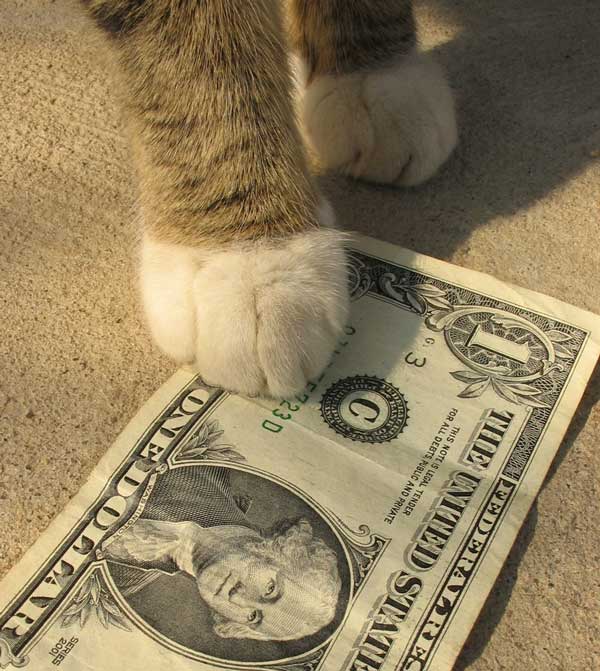How to Avoid Costly Veterinary Bills for Your Cat

It's so important to take your cat to the veterinarian routinely. It's also crucial that you take her in right away if anything changes with her behavior or if she develops any signs of illness.
Still, many people with cats avoid the veterinarian because they feel that they can't afford to go.
Some people avoid taking their cat to the vet because the kitty gets so stressed about going. You can see this article for tips on conquering that issue: "How To Take Your Cat To The Vet."
Here are some ideas for ways to avoid expensive veterinary bills while still being able to provide excellent care for your cat.
Get Pet Insurance
This is an often overlooked source of money for cat owners. Insurance can cover much of a cat's wellness and preventative care as well as emergency treatments and also provide help paying for chronic illnesses. While you can acquire insurance throughout your cat's life, you should consider doing so as soon as possible. Once your cat develops an illness or suffers from an injury, bills associated with that condition will not be covered by a new insurance plan.
You can learn more here: "Pet Insurance: Peace of Mind for Your Cat's Health."
Look Into Care Credit
Care credit is a program that you can apply for which can allow you to put pet care bills and some human health care bills on a credit card that has 0% or very low interest.
If you apply for Care Credit when you get your cat, you'll always know how much credit you have available for emergencies or other situations that might come up.
Open a Special Account and Save a Bit Each Month
Open a special account or ask your bank if you can open sub-accounts under existing ones. Put a little money from each paycheck into that account and keep it specifically for veterinary bills for your cat.
Don't let the idea of saving overwhelm you; even $10 or $15 a month will add up and could help you provide good care for your cat if a need ever arises.
Don't Let Routine Bills Sneak up on You
You should always know what services your cat needs on a routine basis, when they are due, and how much money you'll need for them. Plan ahead to have that money available, so you won't feel stressed, get behind on other bills, or avoid taking your cat in for these critical veterinary services.
Look for a Veterinary Clinic That Offer Wellness Plans
Many clinics offer plans that you can pay for all at once or monthly throughout the year. These often cover all routine care that the clinic feels a cat needs annually. Some of them offer free exams as needed or discounts on services not already included in the plan.
Ask your veterinary clinic if any other discounts are offered which might apply to you. Lower costs are often available for seniors or people who bring multiple pets to the same clinic.
Focus on Prevention Strategies
Prevention is the best treatment for many conditions. Keep your cat as safe as possible by being aware of common dangers and how to avoid them. Here are some articles to visit to help you get started:
"The Dangers of Detergent Pods for Cats"
"Common Plants Poisonous to Cats"
"The Dangers of Strings, Ribbons, and Yarn for Cats"
Talk Openly with Your Veterinarian
Always speak as honestly as possible with your veterinarian about money. He or she can often help you navigate testing and treatment to accommodate your budget and get your cat cared for. Don't decline a treatment plan because of the cost without telling your veterinarian what you can afford and seeing what might be done.
You May Also Like These Articles:
Why Should I Take My Cat to the Vet?
How To Take Your Cat To The Vet
How to Be Prepared for Your Cat's Veterinary Bills
How To Know When Your Cat Is Sick
First Aid for Cats: An Overview
First Aid for a Cat with a Broken Bone
Dealing with End of Life Issues for Your Cat
Handling and Transporting Sick or Injured Cats
Notice: Ask-a-Vet is an affiliated service for those who wish to speak with a veterinary professional about their pet's specific condition. Initially, a bot will ask questions to determine the general nature of your concern. Then, you will be transferred to a human. There is a charge for the service if you choose to connect to a veterinarian. Ask-a-Vet is not manned by the staff or owners of CatHealth.com, and the advice given should not delay or replace a visit to your veterinarian.





